Z-SCAM
Endangered wild animals traded by commercial Asian zoos
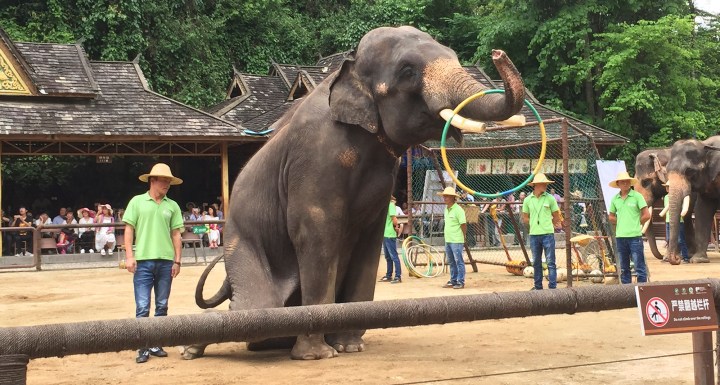
The protection of critically endangered wild animals is being undermined as Asian zoos force them to perform for profit in violation of CITES regulations.
By the transposition of one letter for another in the permit code of the United Nations wildlife trade organisation CITES – Z for zoo instead of T for Commercial – critically endangered wild animals become tradeable for huge sums of money. It’s a loophole so big that the very intention of CITES is being systematically undermined.
The Oxford dictionary defines a zoo as a place where many kinds of wild animals are kept for public exhibition and where they are studied, bred and protected.
This is the spirit of the Convention on International Trade in Endangered Species of Wild Fauna and Flora (CITES) and upon which the agreement to permit sales of certain listed species of endangered wild animals to zoos was based.
It very specifically forbids transactions in Appendix 1-listed species “for primarily commercial purposes” – and for good reason. If zoos were permitted to buy and sell wild animals commercially, it would negate the entire purpose of the CITES Appendix 1 classification.
What the original drafters of that protocol could not have imagined was how certain zoos would morph into massive, money-driven tourist enterprises. Because of its cumbersome bureaucracy (change requires the consensus of 178 countries) CITES has been unable to plug a massive loophole that is ripping into the biodiversity of endangered wild creatures and warping the integrity of countries from which they come.
There’s a further problem. In CITES regulations there’s no definition of a zoo. Trade to zoos is happening under a loose and generous belief that all zoos must be for conservation and education.
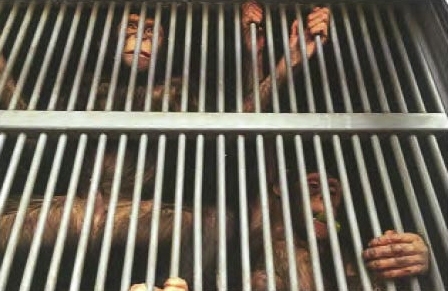
Chimps in a Chinese zoo. (Image: EMS Foundation)
In practice it doesn’t seem to matter if the zoo in question is unable to provide any conservation benefits or even meet minimal welfare requirements, nor does it matter if the trade to this so-called zoo has huge commercial value.
Read more in Daily Maverick: “CITES silent as Zimbabwe dooms elephants to living hell in China”
Countless examples unearthed by wildlife investigator Karl Ammann have shown that by simply proclaiming the transaction to be for zoo purposes, a commercial enterprise and transaction is able to escape from CITES’ most fundamental safeguard.
Protections
Appendix 1 is the highest CITES protection and covers wild-caught animals. It requires that their removal does not endanger the survival of the species, that their capture violated no national laws and that they may not be used for primarily commercial purposes.
Ammann has been ranging across China, Laos, Georgia and Pakistan documenting the types of zoos where wild-caught animals, mostly from Africa, are ending up and the conditions under which they’re kept.
What he found was shocking, with high levels of cruelty and almost zero public education. The sole reason for the animals there was to make money, in some cases eye-watering amounts. Almost all the CITES Appendix 1 safeguards are being ignored. All that seems to be needed is to put a Z (for zoo) on import and export permits.
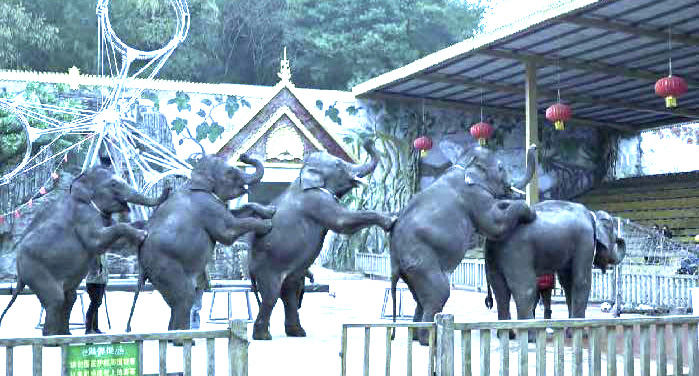
Elephants perform at Guizhou Forest Wildlife Zoo. (Image: EMS Foundation)
According to his report, published by the EMS Foundation, “time and time again commercial operations have been able to import critically endangered Appendix I species by claiming to be a zoo. These facilities are often commercial enterprises, often using animals for entertainment shows and exchanging significant sums of money in doing so.”
Zoo visits
Ammann discovered that the Xishuangbanna Wild Elephant Valley (Jinghong, China) imported 11 wild elephants from Laos and forced them to perform. The “zoo” attracts about 40,000 visitors on weekends, earning more than $2-million.
The Guizhou Forest Wildlife Zoo (Guiyang, China) imported 12 elephants in 2017. There are only nine left, according to the keepers. It is suspected that the other three elephants have been resold.
Keepers at the facility confirmed that they buy elephants from a wildlife dealer, a Mr Zhang, for about$350,000 for an adult (more for an infant). Video footage shows a performance arena with football nets and various other performing props for elephant shows.
Not a single final destination of any of the animals imported from South Africa by Golden Land Animal Trade Co Ltd is known.
Guizhou has an elephant training centre where some elephants are understood to be trained for performances before being moved onto other zoo facilities in China.
In 2019, Longemont Safari Park (Huzhou, Zhejiang, China) imported eight wild elephants from Laos which were trained at Guizhou and are used for performances.
Ammann discovered that the facility, which was opened recently, expects about 30,000 visitors a day, with an expected average $40 entry fee per person, and is guaranteed to generate millions of dollars.
Read more in Daily Maverick: “Zimbabwe: Selling elephants to questionable Chinese destinations damages country’s tourism, say critics”
In 2019, Longemont imported 32 African elephants, of which 20 were kept and trained there while 12 were moved to another safari park. Ammann was told the purchase price for these elephants was $125,000 each.
In two months this year, according to its website, it attracted three million tourists, netting R1.7-billion.
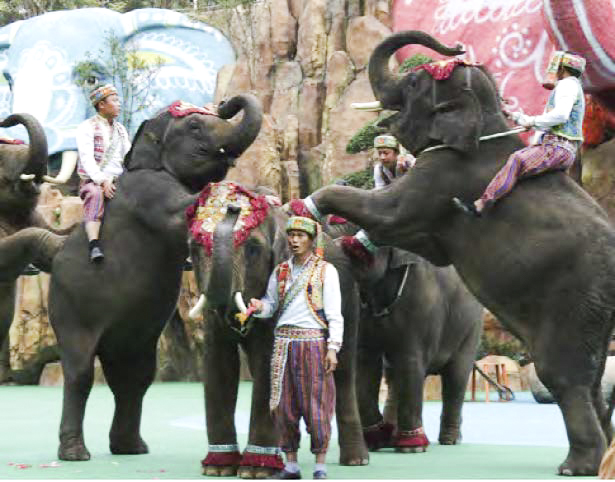
Elephants perform at Longemont Safari Park in China. (Image: Supplied)
Beijing Wildlife Park, which imported four elephants from Laos and 18 chimps from South Africa, is registered as a company with an annual turnover of about $7-million. According to Ammann “its activities are primarily commercial and involve poor treatment of Appendix I elephants in order to generate profit. In accordance with the protections under CITES, import permits should not have been granted.”
The chimps were imported under the Z code and source code C, which means captive bred. There is, however, no evidence that they were conceived in a captive facility in South Africa and were therefore Appendix 1. The chimps, says Ammann, are clearly a key attraction for Beijing Wildlife Park, with the objective of bringing more paying visitors through the door.
Green World Breeding Farm (China) belongs to a Chinese brokering company, Golden Land Animal Trade, which imports animals, sometimes on behalf of other businesses and sometimes to sell off to Chinese and other international zoos. Green World is itself not a zoo.
Visit Daily Maverick’s home page for more news, analysis and investigations
Golden Land was implicated in the smuggling of 138 chimpanzees from Guinea to China between 2007 and 2012. It is also named as one of the biggest of three animal wholesale companies in China that acts as an intermediary for traffickers and final buyers.
This company, says Ammann, boasts about importing most of the wild animals into China. It claims on its website to have imported a number of rare specimens, including elephants and chimps, for more than 100 zoos and aquariums in China in the past 10 years. “Not a single final destination of any of the animals imported from South Africa by Golden Land Animal Trade Co Ltd is known,” says Ammann.
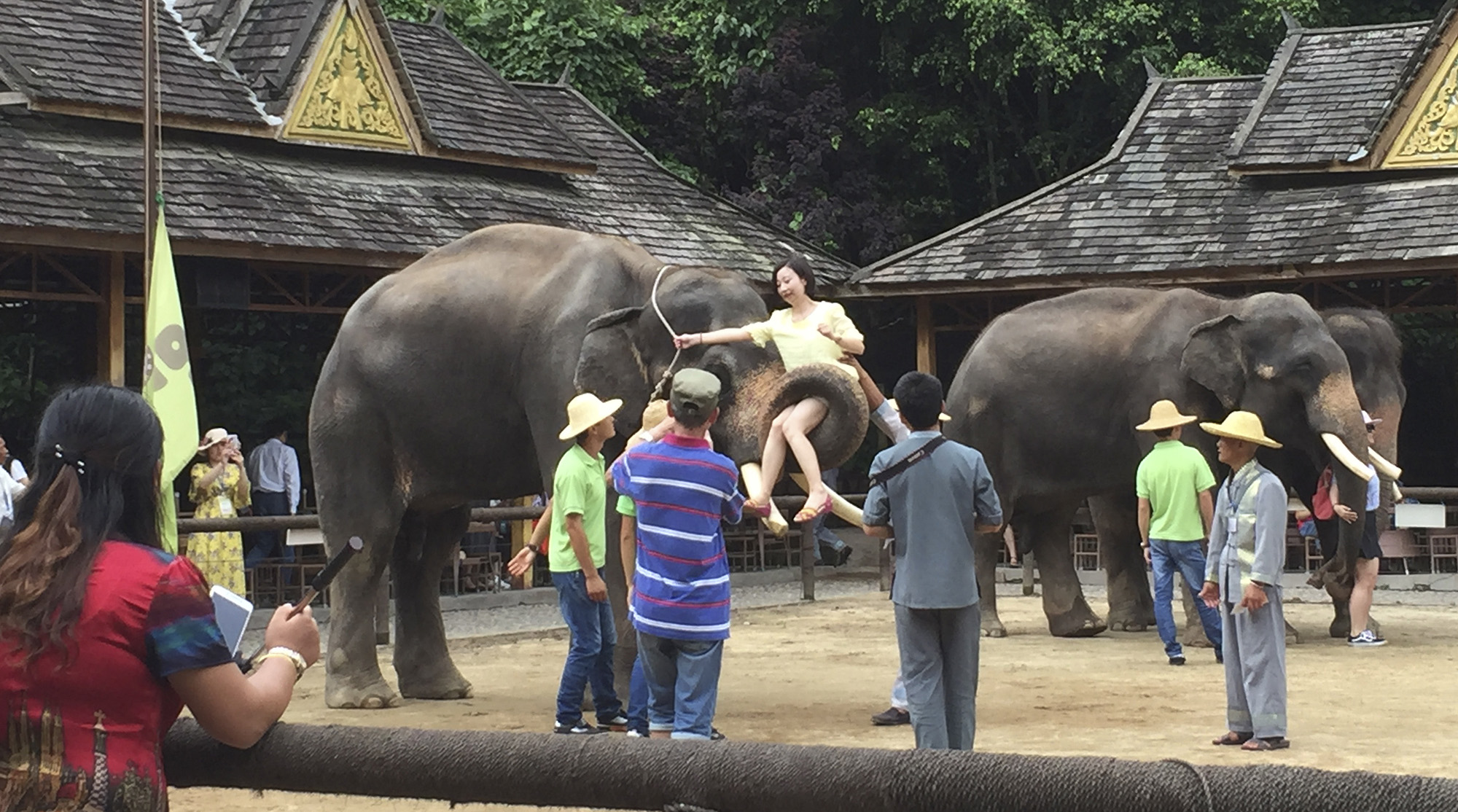
Performing elephants at Elephant Valley in Yunnan Province. (Photo: Francis Garrard)
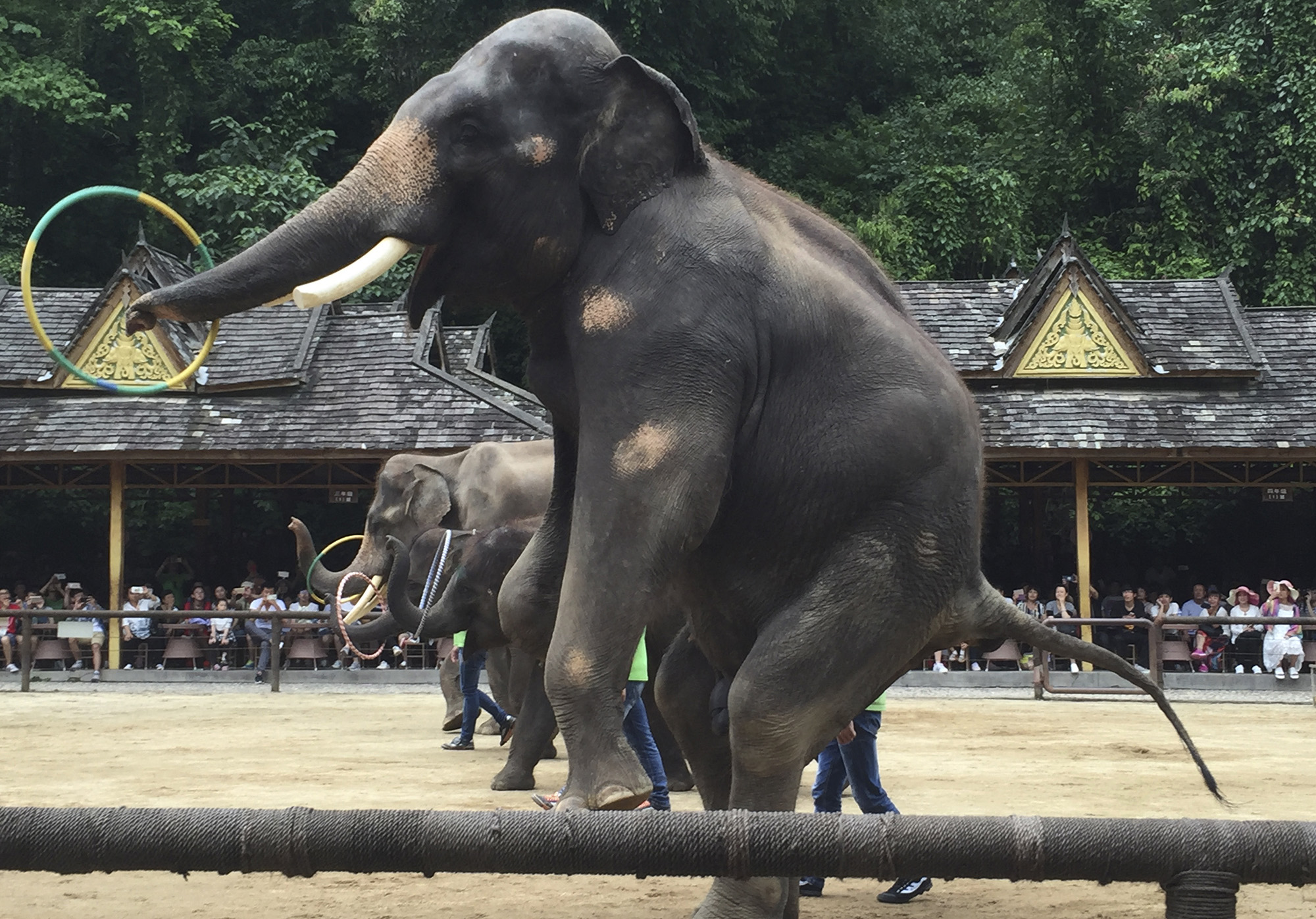
Elephants are forced to perform at Elephant Valley. (Photo: Francis Garrard)
In Pakistan, the secretary of forests and wildlife, Shahid Zaman, said that “surplus” animals at Lahore Zoo would be distributed across 21 wildlife parks and zoos in Punjab for breeding or auctioned to the public. The latter clearly has no conservation value.
Read more in Daily Maverick: “North West trophy hunting, the ghost and the dodgy deal – how Namibian tuskers got to Middle East zoos”
At Zootopia in Georgia, Appendix 1 tamarins and lemurs were imported from Mystic Monkeys & Feathers in South Africa under the Z code but were being kept in a shopping mall with no natural light.
The EMS report proposed a draft resolution to the forthcoming CITES convention, calling on it to frame a clear definition of the term “zoo” and to clarify commercial and non-commercial activities.
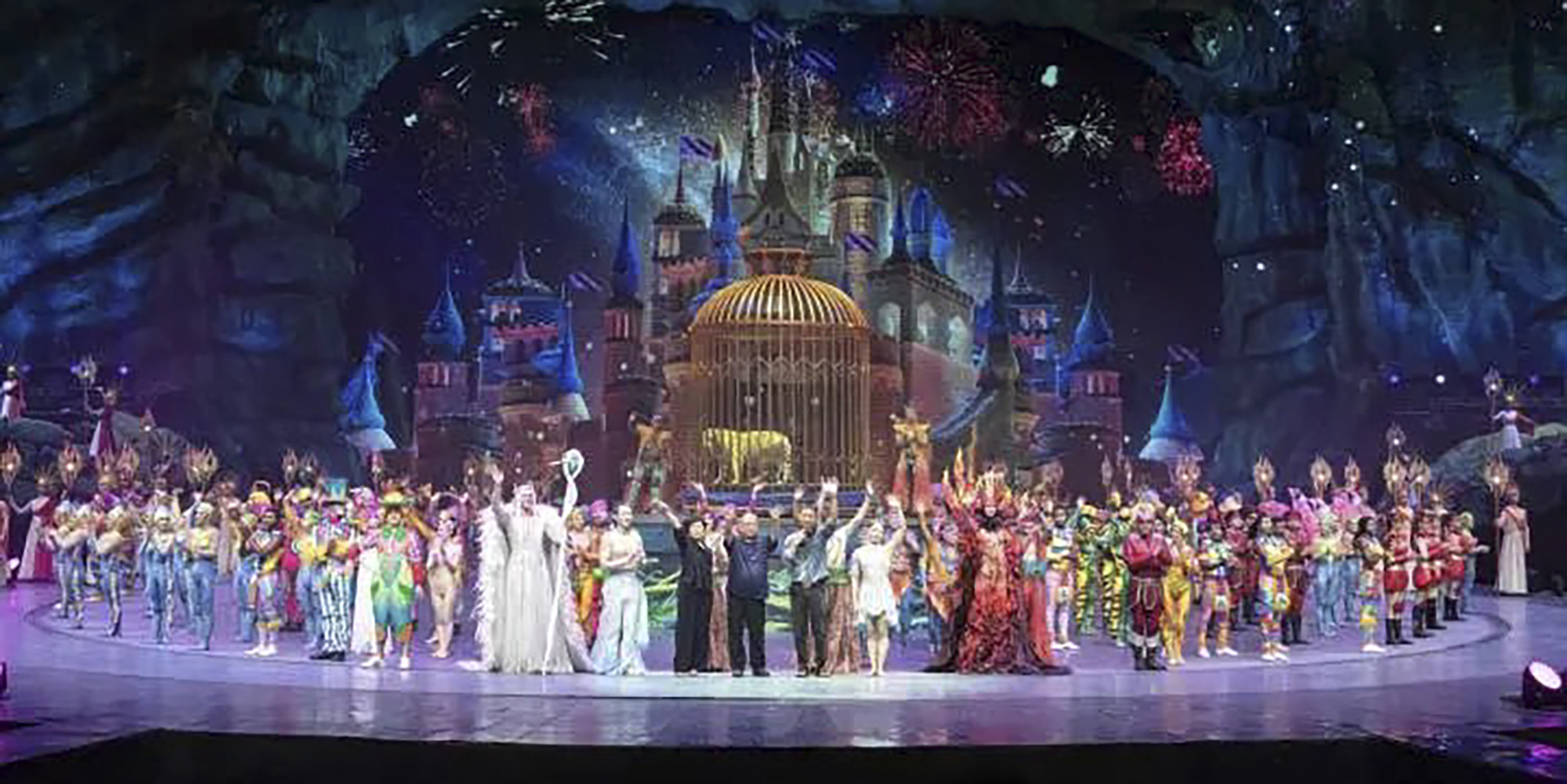
A Longemont Safari Park show. (Image: Karl Ammann)
General principles, it says, should include a clear prohibition of Appendix 1 species being given a Z code if their purpose is primarily commercial. An activity should only be described as “zoological” if it wishes to effectively breed and conserve a species and educate the public on that species.
“Purpose code Z must not be used unless the specimen is kept in a suitable environment for its species and cared for using best practice husbandry.”
The head of CITES legal affairs and compliance, Sophie Hensborg, was approached for comment on this story but, by time of publication, no response had been received. DM/OBP


















 Become an Insider
Become an Insider
Just remember that CITES has nothing to do with conservation or animal welfare. It is an organisation that exists only to control trade and in many cases to facilitate it. In addition, it’s systems are antiquated and completely unfit for purpose. Asian nations (Vietnam, Cambodia, China, Thailand etc) flout the regulations with impunity as there is little or no sanction. South Africa as you would anticipate also steps around the regulations; look at the lion bone saga !. It’s very easy to walk into a South African curio shop and buy items such as hippo teeth and be given a paper CITES permit.